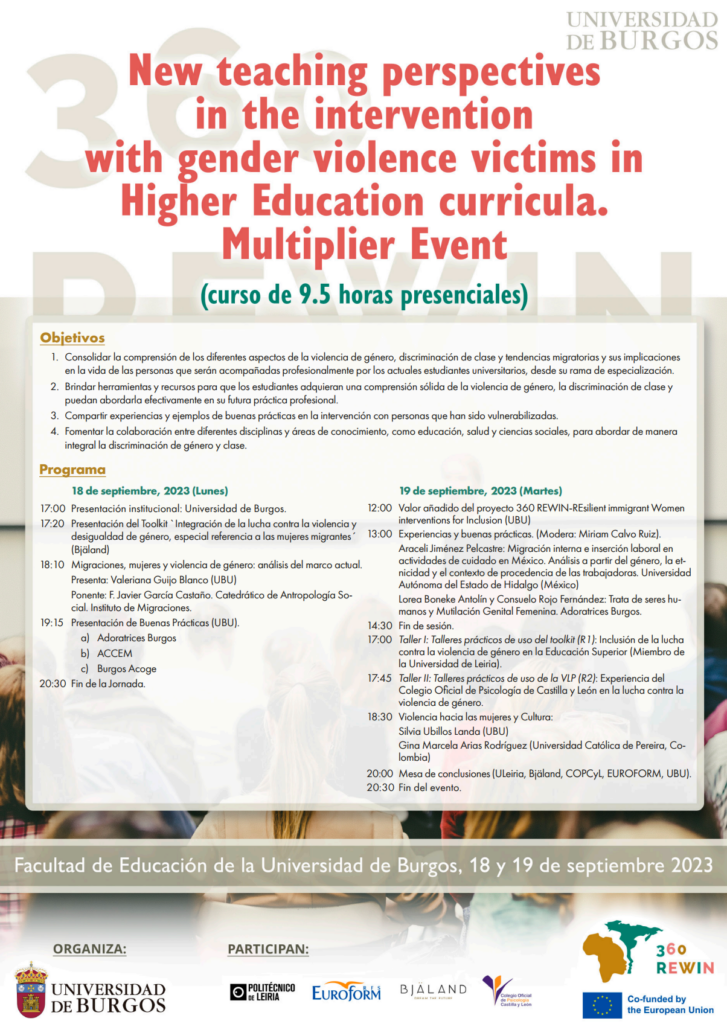Inclusion: Workshops from the 360 REWIN-REsilient Conference
Today’s event has been an essential step in the fight against gender-based violence and the promotion of gender equality. During this intense day, critical issues related to gender-based violence, the inclusion of these topics in higher education, and the importance of culture in perceiving and preventing violence against women have been addressed. Below, we will explore the activities and key themes of the day in detail.
Workshop I: Practical Workshops Using the Toolkit (R1): Inclusion of the Fight Against Gender-Based Violence in Higher Education
The afternoon began with a practical workshop on the use of the toolkit for the inclusion of the fight against gender-based violence in higher education. This workshop was led by a member of the University of Leiria, who shared valuable tools and resources to address this issue in the academic sphere. The inclusion of these topics in higher education is crucial to raise awareness and empower future generations.
During this workshop, participants delved deep into how to incorporate the fight against gender-based violence into curricula and educational practices. Effective strategies for promoting gender equality and educating students on this issue were discussed. Education is a powerful instrument of change, and this workshop highlighted how educational institutions can play a fundamental role in the fight against gender-based violence.

Workshop II: Practical Workshops Using the VLP (R2): Experience of the Official College of Psychologists of Castilla and León in the Fight Against Gender-Based Violence
The second workshop of the day focused on the experience of the Official College of Psychologists of Castilla and León in the fight against gender-based violence. Gender-based violence is a complex issue that requires the involvement of various stakeholders, and the work of psychology professionals plays a crucial role in identifying and supporting victims. This workshop provided valuable information on how to address this issue from a psychological perspective.
Experts shared psychology-based strategies and approaches to support victims of gender-based violence and prevent future cases. They also emphasized the importance of ongoing training for psychology professionals in this field. Awareness and support from the psychological community are essential for effectively addressing gender-based violence.
Violence Against Women and Culture
One of the highlights of the event was the discussion on violence against women and its relationship with culture. Silvia Ubillos Landa from the University of Burgos and Gina Marcela Arias Rodríguez from the Catholic University of Pereira in Colombia shared their research and perspectives on this important topic. Culture plays a fundamental role in the perception and prevention of gender-based violence, and these presentations shed light on the complexity of this relationship.
Silvia Ubillos Landa explored how cultural perceptions influence how gender-based violence is perceived and addressed. Her research highlighted the importance of cultural awareness and the promotion of egalitarian values to prevent violence against women.
Gina Marcela Arias Rodríguez shared perspectives from Colombia, emphasizing how culture and traditions can be both a hindrance and a solution in the fight against gender-based violence. Her presentation underscored the need to understand local cultural dynamics to implement effective strategies.
Conclusion Panel
To conclude the day, a conclusion panel was held, with representatives from the Universidad de Leiria, Bjäland, el Colegio Oficial de Psicología de Castilla y León, EUROFORM and the Universidad de Burgos. This panel provided an opportunity to summarize the day’s discussions and reflections, as well as to identify the next steps in the fight against gender-based violence.
During this session, the need for collaboration among different institutions and the importance of sharing resources and knowledge to effectively combat gender-based violence were emphasized. The progress made during the day was highlighted, and participants were encouraged to continue working together to achieve lasting impact.
Event Closure
At 8:30 PM, the event came to a close, but the impact of today’s discussions and activities will endure for a long time. The fight against gender-based violence is an ongoing task, and events like this are fundamental in raising awareness, educating, and empowering society as a whole.
In summary, today’s event has been a testament to the importance of addressing gender-based violence from multiple perspectives and the need for collaboration among different organizations and stakeholders. Gender-based violence knows no borders and requires a joint effort for prevention and eradication. The commitment and passion of the participants in this event serve as a reminder that, together, we can create a safer and more equitable world for all.
We invite you to visit the YouTube link below to access the recording of this event and obtain more information about the valuable contributions of experts and organizations dedicated to this cause. Education and awareness are powerful tools in our fight against gender-based violence.
Please remember that this is just a summary of the afternoon session on September 19th, and we invite you to watch the event recording for more details and valuable insights provided by the experts and presenters.
Even though this event has concluded, the conversation and action continue. We hope that this day has inspired more people to join the fight and work together to create a safer and more equitable world for everyone. Education and awareness are powerful tools in our fight against gender-based violence. Join us on this important journey!








